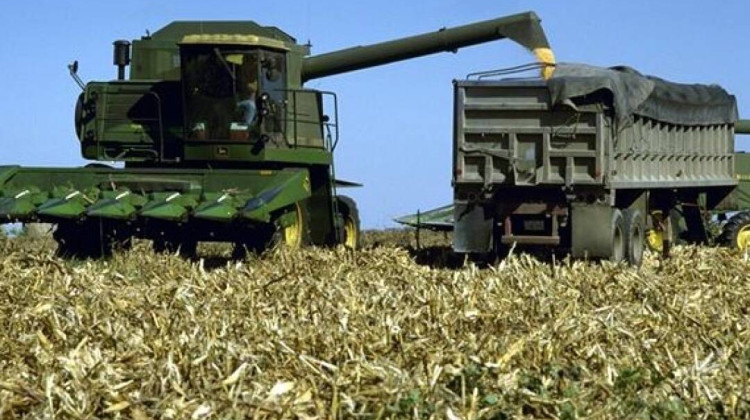
Farmers in southern Indiana say black vultures have been a growing threat to livestock, but -- because they are protected under the Migratory Bird Treaty Act -- any use of lethal force against them requires a permit from the federal government.
Sky Noir/Creative CommonsThe Indiana Farm Bureau this week announced a new, streamlined process for farmers to get kill or “take” permits for black vultures that have been preying on livestock.
Farmers in southern Indiana say black vultures have been a growing threat to livestock, but -- because they are protected under the Migratory Bird Treaty Act -- any use of lethal force against them requires a permit from the federal government.
Greg Slipher, with the Indiana Farm Bureau, said farmers have complained about navigating the federal permitting process for years. According to Slipher, both Kentucky and Tennessee have programs allowing farmers to apply for permits through their local farm bureaus.
“I was inundated with farmers in the southern part of the state about this issue,” he said. “My farmers across the river said well ‘Kentucky can do it, why can’t you guys?”
Under the new program, Slipher said Indiana farmers can now apply for permits through the Farm Bureau.
“Now the Indiana Farm Bureau is the holder of the $100 permit and we provide sub permits to our membership at no cost to them,” he said. “We feel good about helping producers minimize the damage of black vultures to their livelihoods.”
The extent of the problem black vultures pose to Indiana farmers is not yet known. Researchers at Purdue University are in the process of studying both how many farmers are being impacted and the best tools - both lethal and non lethal - for keeping black vultures at bay.
READ MORE: Black Vultures Are Causing Problems On Farms, Purdue Needs Help Researching Them
Bryan Kluever, with the Wildlife Services division of the National Wildlife Research Center, said the change will help expedite the permitting process.
“The Fish and Wildlife Services is very eager to help their customers,” he said. “But just like any entity they only have a certain number of staff. This way they are basically dealing with the farm bureau entity rather than having to answer the questions of potentially hundreds of different farmers.”
Kluever said it’s important to underline that black vultures are an essential part of the ecosystem - serving as nature’s “garbage disposals.”
“They serve an important role and we want them on the landscape,” he said.
Globally, vulture species are in decline and Kluever said they are one of the most “critically endangered groups of birds” in the world. In India, vulture declines have been linked to increases in incidence of rabies.
“It’s a good thing the opposite is going on right now in the United States,” Kluever said. He added that the goal is to find a balance between black vultures and livestock producers.
“The best middle ground between making sure we have enough vultures on the landscape to provide valuable ecosystem services, but also allow individual livestock producers that can be affected the ability to alleviate the problem,” Kluever said.
The Indiana Farm Bureau’s permit currently allows for the take of up to 500 black vultures over a 12-month period.
 DONATE
DONATE







 Support WFYI. We can't do it without you.
Support WFYI. We can't do it without you.